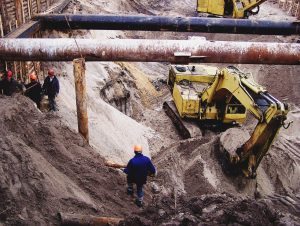In the world of civil construction, every stage of development matters—from planning to execution. Choosing the right excavation method is crucial to ensure the integrity of existing infrastructures and the overall success of a project. That’s where vacuum excavation comes into play, a technique that we specialise in to provide a safer, more precise alternative to traditional excavation methods.
Vacuum excavation is a non-destructive technique that uses air or water to break up soil, which is then removed through a suction hose. This method assists us in cleanly and safely exposing underground utilities and infrastructures without the risk of damaging them. It’s particularly essential in urban areas, where a mix of sewage, gas, water, and telecommunication services complicate digging tasks. By using vacuum excavation, we help deliver civil infrastructure projects faster and with fewer disruptions.
This approach speeds up the digging process and minimises the environmental impact associated with traditional excavation methods. As we focus on each project, our priority remains on maintaining safety standards, project efficiency, and environmental protection—all of which are critical components for the success and sustainability of civil infrastructure developments. Continue reading to learn more about how vacuum excavation is transforming the landscape of civil construction, making it safer and more reliable than ever.
What Is Vacuum Excavation and Why Is It Important for Civil Infrastructure?
Vacuum excavation is a modern excavation technique that uses air or water to loosen the soil, which is then sucked up into a tank through a powerful vacuum system. This method allows us to safely expose underground pipes and cables without the physical contact that traditional digging methods require. For civil infrastructure projects, the accuracy and safety of vacuum excavation make it invaluable. Traditional excavation can sometimes hit and damage utilities like water pipes or electrical cables, causing delays, expensive repairs, and potentially hazardous situations.
The importance of vacuum excavation in civil infrastructure cannot be overstated, particularly in densely populated or highly developed areas. The precise nature of vacuum excavation reduces the risk of damaging existing infrastructure, ensuring that other services remain uninterrupted during construction. This can include anything from underground transportation channels to sewage systems, all of which support the daily function of our cities. By employing vacuum excavation, we uphold the integrity of these existing systems while progressing with new developments.
The Benefits of Vacuum Excavation in Protecting Underground Utilities
One of the most critical aspects of vacuum excavation is its ability to protect underground utilities from damage during excavation. Traditional digging methods often involve heavy machinery, which can be cumbersome and pose a significant risk to buried utilities. With vacuum excavation, the risk of striking an underground utility is greatly reduced, which is crucial for the prevention of service interruptions and costly damages.
This method is particularly advantageous when working around sensitive infrastructure like gas lines, fiber optic cables, and water mains. By using high-pressure air or water to break up the soil, we can clearly see and avoid these utilities, ensuring they remain intact and functional. The precision of vacuum excavation also allows for smaller, more controlled dig sites, which is essential in urban environments where space is often limited and every inch counts.
Furthermore, protecting these utilities is not just about avoiding immediate physical damage. It’s also about ensuring that there is no disruption of services which can affect thousands of people and lead to significant financial implications. This proactive approach saves time and resources and avoids the potential fallout of community disruption associated with utility repairs.
Reducing Environmental Impact with Vacuum Excavation Techniques
An integral part of our commitment to sustainability is minimising the environmental footprint of our excavation activities. Vacuum excavation plays a crucial role in this effort. This method is significantly more gentle on the earth compared to traditional excavation techniques. By selectively targeting the dig area and reducing the amount of displaced soil, vacuum excavation lessens soil erosion and disruption to the surrounding land.
Moreover, vacuum excavation helps in protecting underground water sources and ecosystems. The precision of this technique prevents accidental punctures to pipelines, which can lead to leaks and contamination of the local environment. We ensure that all extracted materials are safely contained and disposed of, adhering to environmental standards. This proactive approach not only supports the preservation of local flora and fauna but also ensures that the impact of construction work is reversible, maintaining the natural balance.
Ensuring Safety and Compliance in Civil Construction Projects Through Vacuum Excavation
Safety and compliance are paramount in civil construction projects, and vacuum excavation is a tool that significantly enhances both. By avoiding mechanical digging methods, we substantially reduce the risk of accidents on site. The non-invasive nature of vacuum excavation limits workers’ exposure to potential underground hazards, such as live wires or unstable soil conditions, which are common with traditional excavation.
Our adherence to regulatory standards is uncompromised, as vacuum excavation allows us to follow the planned excavation guidelines without deviations precisely. This precision ensures that all safety protocols are observed, reducing the likelihood of regulatory penalties. Furthermore, the ability to control the excavation site more effectively allows for a cleaner and more orderly work environment, which is essential for maintaining safety standards on busy construction sites.
Conclusion
At iVac WA, we champion the adoption of innovative techniques that enhance efficiency and foster environmental sustainability. Vacuum excavation stands out as a superior method, safeguarding the infrastructure and the environment and ensuring our operations’ safety and compliance. We pride ourselves on providing solutions that contribute positively to the industry and society. Embrace the change with us; choose iVac WA for your upcoming civil construction projects to experience top-tier service that aligns with strict safety and environmental standards. Let’s build a safer, cleaner, and more efficient future together.

